This article was co-authored by Ran D. Anbar, MD, FAAP. Dr. Ran D. Anbar is a pediatric medical counselor and is board certified in both pediatric pulmonology and general pediatrics, offering clinical hypnosis and counseling services at Center Point Medicine in La Jolla, California and Syracuse, New York. With over 30 years of medical training and practice, Dr. Anbar has also served as a professor of pediatrics and medicine and the Director of pediatric pulmonology at SUNY Upstate Medical University. Dr. Anbar holds a BS in Biology and Psychology from the University of California, San Diego and an MD from the University of Chicago Pritzker School of Medicine. Dr. Anbar completed his pediatric residency and pediatric pulmonary fellowship training at the Massachusetts General Hospital and Harvard Medical School and is also a past President, fellow and approved consultant of the American Society of Clinical Hypnosis.
There are 17 references cited in this article, which can be found at the bottom of the page.
This article has been viewed 105,128 times.
Being sick is not fun for anyone. Any illness, even a common cold, can have a negative impact not just on your physical health, but on your mental health, too. When you're sick, it's easy to let yourself get into a funk. That can make your physical symptoms feel even more severe. When you're feeling ill, try to use some specific coping mechanisms to help keep your spirits up. There are also steps you can take to treat your physical symptoms.
Steps
Focusing on Your Emotional Health
-
1Take a break. For many people, it can be difficult to take a time out from life when feeling under the weather. But trying to carry on with your daily routine when you are sick can have many negative impacts. Not only will you risk passing your illness to others, but you may end up feeling even more stressed. When you are sick, you need to take a break from your responsibilities as much as possible.[1]
- Call in sick. Even though you may have a lot of responsibilities at your job, you are not doing anyone any favors by showing up to work when you have a cold or the flu. You won't be able to function at full capacity, and this could make you frustrated and emotional.
- If you have a fever, your thought process will slow down. When you can't work at your normal rate, you'll just be trying to play catch up all day.
- Give yourself permission to have a day off. Remind yourself that your body (and mind) will function much better after you give it time to heal.
- Allow yourself to take some time off from other commitments, too. For example, maybe you've agreed to go see a movie with a friend. Instead of forcing yourself to go, reschedule for when you feel better.
- If you need to take off for an extended time, look for ways you can be helpful in your workplace from home. For instance, maybe you can still complete some of your work, even if you're not in the office.[2]
-
2Use relaxation techniques. Being sick can cause you to feel cranky. It's understandable that whether you are suffering from an upset stomach or a sore throat, you're not going to be at your most cheerful. When you're under the weather, you can also feel increased levels of stress if you're worried about falling behind at work or not feeling up to making a healthy dinner for your family. Part of the healing process is feeling better mentally, so make a conscious effort to relax and lower your stress levels.[3]
- Try progressive muscle relaxation. In a comfortable position, take some time to tense and then relax each muscle group in your body. For example, clench your hand for five seconds, then release for thirty seconds. Do this until you've hit every spot. This relaxation technique can help ease muscle tension.
- Deep breathing is another useful technique. Focus on your breath, and allow your mind to wander. Draw deep breaths in for about 6-8 counts, then exhale for the same count.
- Visualization is an excellent way to reduce tension. Focus on something you find pleasant, such as sitting in the park on a nice day. Use all of your senses. Picture the bright blue sky and imagine feeling the warmth of the sun on your skin.
- You can even try things like meditation or hypnosis to help your mind and body heal more effectively. For instance, in hypnosis, you might imagine your immune system overcoming the organism that is causing your illness.[4]
- Relaxation techniques have many benefits, such as relieving pain and boosting energy.
Advertisement -
3Lean on friends and family. When you're sick, it can be overwhelming to complete even the simplest tasks. Try to let your friends and family help you out and ease some of your stress. If you have a partner, ask him to cook you a healthy dinner. If you live alone, ask a friend if they would mind dropping a care package by your house.[5]
- Don't be afraid to ask for help. Often, we feel uncomfortable asking for assistance. But if you're sick, others will be happy to help. Be specific in your requests, so that you get what you need. For example, ask your friend, "Would you mind going to the pharmacy on 35th Street and picking up the prescription that is in my name?"
- Try not to isolate yourself completely. When you're sick, you don't want to spread germs. But that doesn't mean you need to withdraw completely. E-mail or text a good friend and ask for some virtual company. Knowing you're not alone can help lift your spirits.
-
4Focus on the positive. Doctors report that people who practice positive thinking are generally in better health. Studies also show that positive thinking lowers stress levels and helps you to cope during difficult times. Being sick can certainly be stressful, so it makes sense that positive thinking can help you to feel better.[6]
- Let yourself laugh. It's easy to feel grouchy when you're sick, but if something strikes you as funny, don't be afraid to show it. Even if it is as simple as seeing a silly commercial on tv, laughing can help your frame of mind.
- Filter negative thoughts out. If you find yourself lying in bed and thinking about the pile of dirty laundry nearby, shift your focus. Instead, glance out the window and be glad that you're inside on a gloomy day.
- Instead of focusing on the negative impact of taking time off work, think about the positive, like the fact that you can spend more time with your family or catch up on much-needed sleep.[7]
-
5Choose uplifting entertainment. Being sick is an excellent time to indulge in some of your guilty pleasures. Maybe you have a favorite tv show that you've been missing because of a hectic schedule. Or perhaps you have a stack of magazines by your bed waiting to be read. Now's the time! Just choose wisely--you want something that will improve your mood.[8]
- You might feel overly emotional when you are ill. This means that it is probably not the best time to binge watch that documentary about crime in your city. A depressing or serious show can add to your anxiety.
- Choose a lighthearted show, movie, or book to help take your mind off of your queasy stomach. A good comedy can help the world seem a lot brighter.
Addressing Your Physical Symptoms
-
1Get some rest. Sleeping is one of the most effective ways to help your body heal when you are sick. When you are healthy, you need about 7-8 hours of sleep per night. Aim to get at least a couple of extra hours when you are sick. Sleep can help your body repair itself.[9]
- If you have a cough or cold, it can be difficult to sleep. Try propping yourself up and sleeping at an angle. You'll breathe more easily, which will help you rest.
- Try sleeping alone. When you are sick, you might toss and turn more. Ask your partner to move to the guest room for the night. You need your space, and the extra peace and quiet will help you get the rest you need.
- Remember that your good health is a top priority. By focusing on healing you are preparing to be more productive in life and at work. Also, by staying home, you're protecting your fellow workers from exposure to your illness.[10]
-
2Stay hydrated. When you are sick, your body is using more water than usual. For example, if you have a fever, you might be sweating out part of your water supply. If you have diarrhea or are vomiting, you are also losing fluids. Your body will have a hard time healing if you don't replenish your lost fluid. Make sure to increase hydration when you are sick.[11]
- Water is a great choice, but sometimes other fluids taste or feel better when you are sick. You could try some hot tea with ginger, for example, to settle an upset stomach.
- Juice and warm soups are also great for staying hydrated.
-
3Eat right. Healthy foods can help your body heal when you are sick. Eating something that tastes good can also boost your mood. Eat nutritious foods when you are sick. If someone else can do the cooking, even better.[12]
- Chicken soup can actually make you feel better. Not only will the broth keep you hydrated, but the warmth can reduce congestion.
- Honey is an excellent way to soothe a sore throat. Try adding some to tea or yogurt.
- Spicy foods can help loosen up the mucus that causes congestion. It is also a good choice for taste buds that are dull from a stuffy nose. Try eating a Mexican soup or some spicy tomato juice.
- It's important to eat even if your stomach is upset. If nothing sounds appetizing, try to at least eat some crackers. The starch will help soak up the extra stomach acid your body is producing.
-
4Take medications. Medicines can work wonders on many different illnesses. Whether you have a prescription from your doctor or an over the counter pill, taking the proper medication can ease your symptoms and speed your recovery. Make sure to only take the prescribed dosages for any medication.[13]
- Talk to your pharmacist. He is an excellent resource if you are overwhelmed by the amount of cold, flu, and allergy medications that are available. Ask him to recommend a trusted brand.
- Choose a medication that will treat your symptoms. For example, if you have a cough that is keeping you awake at night, look for a medication that also combats sleeplessness.
- Take a pain killer. Being sick often comes with aches and pains. Try taking ibuprofen or aspirin to ease the pain and lower your fever. However, keep in mind that aspirin is not recommended for children because of the risk of Reye Syndrome.[14]
- Consult your doctor if you have any allergies or other medical conditions that might cause a reaction to medications. It is important to check because some cold and flu medications can raise high blood pressure even more. Some medications may also make lung conditions worse.
-
5Try home remedies. If you don't want to try medication, there are many simple home remedies you can use to cure a lot of common ailments. For example, if you are suffering from a sore throat, try gargling with salt water. Simply dissolve a teaspoon of salt into 8 ounces of warm water and swish/gargle in your mouth and throat for several seconds.[15]
- If you are nauseous, ginger is an effective natural remedy. Try adding some fresh grated ginger root to your hot tea. Or snack on some ginger snaps and wash it down with ginger ale.
- Add moisture to the air. Try using a vaporizer or humidifier in your home. The moist air can help relieve congestion.
- A heating pad can relieve symptoms of several illnesses. If your stomach is cramping, place heat on your abdomen. If you have swollen glands, such as with mononucleosis, try placing a warm wrap around your neck.
Preventing Future Illness
-
1Adopt healthy habits. Although it is impossible to avoid getting sick, there are steps you can take to make sure that it happens less often. Living a healthy lifestyle can strengthen your immune system and make your body more resistant to illness. Make healthy habits part of your daily routine.[16]
- Eat a healthy diet. Make sure to get plenty of fruits and vegetables. Try to make sure that each meal includes several different colors. For example, include some leafy greens, a colorful fruit, and a healthy starch, such as a sweet potato. Don't forget the lean protein.
- Exercise regularly. Frequent exercise has amazing benefits to your health. It can lower blood pressure, cholesterol, and stress levels. Try to be active for at least 30 minutes a day, six days a week.
- Get plenty of sleep. Aim for at least 7-8 hours each night. Try to go to bed and wake up at the same time each day. This will help make sleep a part of your healthy routine.
- Try taking a daily vitamin C and zinc supplement to help prevent illness.[17]
- Keep in mind that it is okay to walk away from someone who is coughing to protect yourself. You can also move to a different seat if you are in a public place, such as on a bus or train.
-
2Sanitize your surroundings. Germs are a fact of life. But you can take steps to minimize your exposure. For example, wipe down your work surface at the beginning and end of each day. Keep some sanitizing wipes in your desk for this purpose.
- Wash your hands. You should wash your hands with warm water and soap for at least 20 seconds several times a day. Wash after contact with animals, food, or after you touch your mouth or nose.[18]
-
3Minimize stress. Studies show that stress can actually make you ill. Not only does it cause health issues such as high blood pressure, but it can also manifest in tension headaches and upset stomach. To live your healthiest life, try to reduce your stress.[19]
- Take time outs when you need them. When you are in a stressful situation, give yourself permission to step away for a minute. For example, if you are fighting with your roommate about whose turn it is to clean the bathroom, excuse yourself to take a quick walk around the block.
- Make time for yourself. Give yourself permission to relax each day. Take the time to do something you like, such as reading a book before bed, or watching your favorite tv show.
Expert Q&A
-
QuestionIs it better to rest when sick?
 Ran D. Anbar, MD, FAAPDr. Ran D. Anbar is a pediatric medical counselor and is board certified in both pediatric pulmonology and general pediatrics, offering clinical hypnosis and counseling services at Center Point Medicine in La Jolla, California and Syracuse, New York. With over 30 years of medical training and practice, Dr. Anbar has also served as a professor of pediatrics and medicine and the Director of pediatric pulmonology at SUNY Upstate Medical University. Dr. Anbar holds a BS in Biology and Psychology from the University of California, San Diego and an MD from the University of Chicago Pritzker School of Medicine. Dr. Anbar completed his pediatric residency and pediatric pulmonary fellowship training at the Massachusetts General Hospital and Harvard Medical School and is also a past President, fellow and approved consultant of the American Society of Clinical Hypnosis.
Ran D. Anbar, MD, FAAPDr. Ran D. Anbar is a pediatric medical counselor and is board certified in both pediatric pulmonology and general pediatrics, offering clinical hypnosis and counseling services at Center Point Medicine in La Jolla, California and Syracuse, New York. With over 30 years of medical training and practice, Dr. Anbar has also served as a professor of pediatrics and medicine and the Director of pediatric pulmonology at SUNY Upstate Medical University. Dr. Anbar holds a BS in Biology and Psychology from the University of California, San Diego and an MD from the University of Chicago Pritzker School of Medicine. Dr. Anbar completed his pediatric residency and pediatric pulmonary fellowship training at the Massachusetts General Hospital and Harvard Medical School and is also a past President, fellow and approved consultant of the American Society of Clinical Hypnosis.
Pediatric Pulmonologist & Medical Counselor Yes! Your health and wellbeing are most important. Give yourself time to rest and recover. When you recover, you'll be much more productive in your work and life.
Yes! Your health and wellbeing are most important. Give yourself time to rest and recover. When you recover, you'll be much more productive in your work and life. -
QuestionHow do I stop feeling so irritated when sick?
 Jurdy Dugdale, RNJurdy Dugdale is a Registered Nurse in Florida. She received her Nursing License from the Florida Board of Nursing in 1989.
Jurdy Dugdale, RNJurdy Dugdale is a Registered Nurse in Florida. She received her Nursing License from the Florida Board of Nursing in 1989.
Medical Review Board The secret to success is putting your daily routine on hold and allowing yourself the time you need to heal. If you do not stop and you try to keep going, then you will be irritated. However, if you have decided to take time off, then rest and treat yourself well and you will not be irritated. Being irritated is a sign that you are not taking the time you need for yourself.
The secret to success is putting your daily routine on hold and allowing yourself the time you need to heal. If you do not stop and you try to keep going, then you will be irritated. However, if you have decided to take time off, then rest and treat yourself well and you will not be irritated. Being irritated is a sign that you are not taking the time you need for yourself. -
QuestionHow do I stop feeling bad when I have to take time off from work because I've been sick?
 Ran D. Anbar, MD, FAAPDr. Ran D. Anbar is a pediatric medical counselor and is board certified in both pediatric pulmonology and general pediatrics, offering clinical hypnosis and counseling services at Center Point Medicine in La Jolla, California and Syracuse, New York. With over 30 years of medical training and practice, Dr. Anbar has also served as a professor of pediatrics and medicine and the Director of pediatric pulmonology at SUNY Upstate Medical University. Dr. Anbar holds a BS in Biology and Psychology from the University of California, San Diego and an MD from the University of Chicago Pritzker School of Medicine. Dr. Anbar completed his pediatric residency and pediatric pulmonary fellowship training at the Massachusetts General Hospital and Harvard Medical School and is also a past President, fellow and approved consultant of the American Society of Clinical Hypnosis.
Ran D. Anbar, MD, FAAPDr. Ran D. Anbar is a pediatric medical counselor and is board certified in both pediatric pulmonology and general pediatrics, offering clinical hypnosis and counseling services at Center Point Medicine in La Jolla, California and Syracuse, New York. With over 30 years of medical training and practice, Dr. Anbar has also served as a professor of pediatrics and medicine and the Director of pediatric pulmonology at SUNY Upstate Medical University. Dr. Anbar holds a BS in Biology and Psychology from the University of California, San Diego and an MD from the University of Chicago Pritzker School of Medicine. Dr. Anbar completed his pediatric residency and pediatric pulmonary fellowship training at the Massachusetts General Hospital and Harvard Medical School and is also a past President, fellow and approved consultant of the American Society of Clinical Hypnosis.
Pediatric Pulmonologist & Medical Counselor Rather than focusing on how you feel sick or the negative impact of taking time off from work, think about what you can gain from your time at home. Does it give you time to think about your life and how you might improve it? Does it allow you to spend more time with your family, read, watch television, or sit in the backyard? Does it give you a chance to catch up on much-needed sleep?
Rather than focusing on how you feel sick or the negative impact of taking time off from work, think about what you can gain from your time at home. Does it give you time to think about your life and how you might improve it? Does it allow you to spend more time with your family, read, watch television, or sit in the backyard? Does it give you a chance to catch up on much-needed sleep?
Warnings
- See a doctor if the cough is productive with yellow sputum, or if you have burning sensations when you urinate. If you feel pressure or a sharp pain when you inhale, then this may also be a sign of walking pneumonia and you need to see a doctor. Also, if you have diabetes, then you should see your doctor early on for flu symptoms. If your symptoms are caught early enough, then you can take medication to shorten the lifespan of the flu bug.⧼thumbs_response⧽
- Seek medical attention immediately if you have a cold or flu and a fever above 102 degrees Fahrenheit or one that lasts for more than a few days, shortness of breath or trouble breathing, a cold that lasts 10 days or more, pressure or pain in your chest, fainting, or confusion. You should also seek help for children with these symptoms or if they are not drinking enough fluid, have bluish skin, have an earache or ear drainage, start behaving differently (irritable, difficulty waking up), have flu symptoms that go away and then come back, or if they have a chronic issue, like diabetes.[20]⧼thumbs_response⧽
References
- ↑ http://www.webmd.com/cold-and-flu/features/too-sick-to-work
- ↑ Ran D. Anbar, MD, FAAP. Pediatric Pulmonologist & Medical Counselor. Expert Interview. 1 July 2020.
- ↑ http://www.mayoclinic.org/healthy-lifestyle/stress-management/in-depth/relaxation-technique/art-20045368
- ↑ Ran D. Anbar, MD, FAAP. Pediatric Pulmonologist & Medical Counselor. Expert Interview. 1 July 2020.
- ↑ https://www.helpguide.org/articles/grief/coping-with-a-life-threatening-illness.htm
- ↑ http://www.mayoclinic.org/healthy-lifestyle/stress-management/in-depth/positive-thinking/art-20043950
- ↑ Ran D. Anbar, MD, FAAP. Pediatric Pulmonologist & Medical Counselor. Expert Interview. 1 July 2020.
- ↑ https://www.helpguide.org/articles/mental-health/laughter-is-the-best-medicine.htm
- ↑ https://www.mayoclinic.org/diseases-conditions/insomnia/expert-answers/lack-of-sleep/faq-20057757
- ↑ Ran D. Anbar, MD, FAAP. Pediatric Pulmonologist & Medical Counselor. Expert Interview. 1 July 2020.
- ↑ https://www.mayoclinic.org/healthy-lifestyle/nutrition-and-healthy-eating/in-depth/water/art-20044256
- ↑ https://health.clevelandclinic.org/the-best-foods-to-eat-when-youre-sick/
- ↑ http://www.fda.gov/Drugs/ResourcesForYou/ucm163330.htm
- ↑ https://www.cdc.gov/mmwr/preview/mmwrhtml/00001108.htm
- ↑ http://www.mayoclinic.org/diseases-conditions/common-cold/in-depth/cold-remedies/art-20046403
- ↑ https://health.clevelandclinic.org/11-simple-health-habits-worth-adopting-into-your-life/
- ↑ https://www.health.harvard.edu/cold-and-flu/can-vitamin-c-prevent-a-cold
- ↑ http://www.cdc.gov/features/handwashing/
- ↑ https://www.mayoclinic.org/healthy-lifestyle/stress-management/in-depth/stress-relievers/art-20047257
- ↑ http://www.aafp.org/afp/2006/1001/p1179.html
About This Article
To cope with being sick, call in sick to work so you can take a day off to rest and recover. You should also try to sleep for a few extra hours so your body can recover. Since your body will use more water than usual, make sure to stay hydrated by drinking plenty of fluids throughout the day. Once you're able to eat something, try chicken soup to reduce congestion or honey to soothe a sore throat. Even if you don’t feel like eating, try to have some crackers, which will help soak up the extra stomach acid your body will be producing. If you’re struggling with a cough or fever, try taking an over-the-counter medication to combat your symptoms. Additionally, watch your favorite show or read a magazine you enjoy to take your mind off your illness. For tips from our Medical co-author, including how to treat your symptoms with home remedies, keep reading!






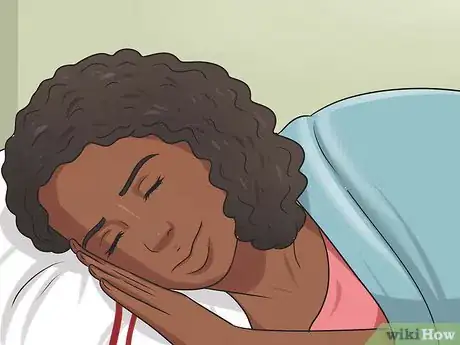


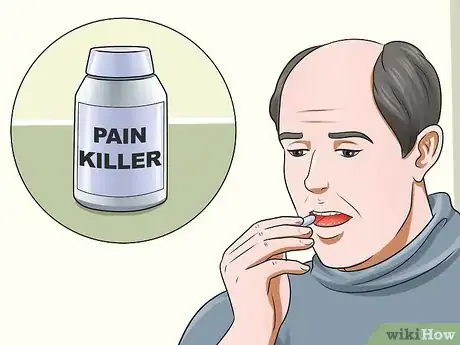


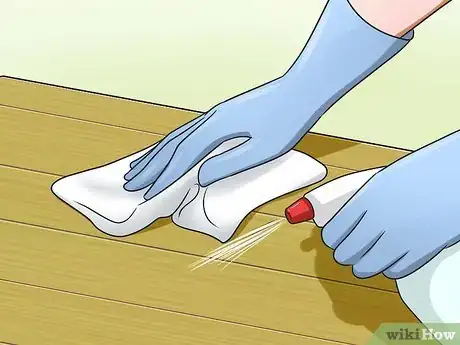

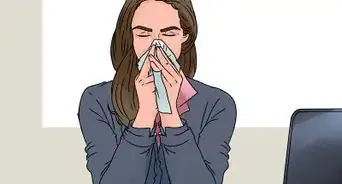




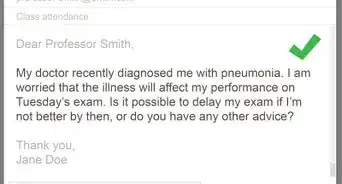

-Step-14-Version-2.webp)














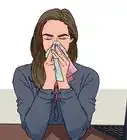






































Medical Disclaimer
The content of this article is not intended to be a substitute for professional medical advice, examination, diagnosis, or treatment. You should always contact your doctor or other qualified healthcare professional before starting, changing, or stopping any kind of health treatment.
Read More...